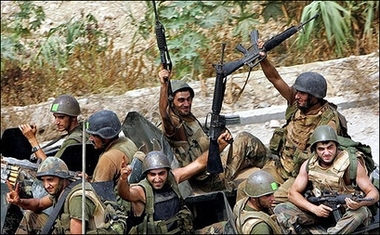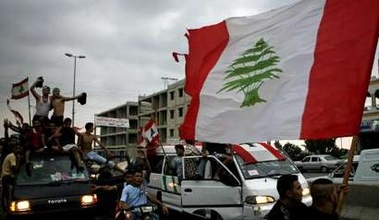 Lebanese soldiers searched through devastated buildings and scorched bushes along the Mediterranean coastline in northern Lebanon on Monday, hunting for fugitives a day after the army crushed the remnants of a militant group and ended a three-month siege at a Palestinian refugee camp.Meanwhile, the body of the leader of the militant Fatah Islam group, Shaker al-Absi, was identified by his wife at a hospital in the port city of Tripoli, said Nasser Adra, the hospital’s director. Two captured militants also identified the body as Absi’s.
Lebanese soldiers searched through devastated buildings and scorched bushes along the Mediterranean coastline in northern Lebanon on Monday, hunting for fugitives a day after the army crushed the remnants of a militant group and ended a three-month siege at a Palestinian refugee camp.Meanwhile, the body of the leader of the militant Fatah Islam group, Shaker al-Absi, was identified by his wife at a hospital in the port city of Tripoli, said Nasser Adra, the hospital’s director. Two captured militants also identified the body as Absi’s.
 However, Adra told The Associated Press that the hospital could not officially confirm the identity, which would have to come from the judicial authorities after a DNA test.Absi, a Palestinian linked to the late leader of Al Qaeda in Mesopotamia, Abu Musab al-Zarqawi, had not been seen or heard from since early in the fighting that erupted May 20.The army searched Monday for Fatah Islam fighters who may have escaped the battle on Sunday at the Nahr al Bared camp. Patrol boats were looking for bodies in the sea. Military helicopters flew over the camp in low reconnaissance runs, as smoke from smoldering fires rose into the sky.
However, Adra told The Associated Press that the hospital could not officially confirm the identity, which would have to come from the judicial authorities after a DNA test.Absi, a Palestinian linked to the late leader of Al Qaeda in Mesopotamia, Abu Musab al-Zarqawi, had not been seen or heard from since early in the fighting that erupted May 20.The army searched Monday for Fatah Islam fighters who may have escaped the battle on Sunday at the Nahr al Bared camp. Patrol boats were looking for bodies in the sea. Military helicopters flew over the camp in low reconnaissance runs, as smoke from smoldering fires rose into the sky.
The camp remained off limits to its Palestinian civilian population, which had fled in the early days of fighting. But the main north-south highway outside was open to traffic.
Inside the camp, military sappers combed destroyed neighborhoods, looking for booby traps, unexploded shells and mines. Investigators, meanwhile, were questioning captured militants.
The search followed the final battle on Sunday between the army and Al Qaeda-inspired Fatah Islam militants, which left 39 fighters and 3 soldiers dead as the militants attempted a dawn breakout from Nahr al Bared.
Some of the militants tried to sneak out through a tunnel, while another group tried to escape through a different path. Outside fighters arrived to help them, security officials said.
The army quickly deployed reinforcements, blocked surrounding roads, set fires to nearby fields to deny fleeing militants a hiding place and put up checkpoints as far as Beirut and southern Lebanon. Villagers of nearby settlements, armed with guns and sticks, also came out to help the army and protect their houses, state television reported.
By the end of the day, the camp was in Lebanese Army control and the authorities declared victory over Fatah Islam. Officials said the army had killed 39 militants and captured 20. It was not immediately known how many militants managed to escape.
The camp siege began on May 20, when Fatah Islam fighters who had taken control of the camp attacked nearby army checkpoints, killing 22 soldiers. The army said that 5 soldiers had been killed in the weekend fighting, raising to 158 the number of troops who have died in the conflict.
As news from the camp spread, Lebanese from different political backgrounds, including those allied to Hezbollah, took to the streets across the country in celebration. Television shows showed residents in northern cities waving Lebanese flags and throwing rice at passing soldiers.
"The army is emerging as the guardian of the state of Lebanon," said Hilal Khashan, a political science professor at the American University of Beirut. "Politicians have failed; therefore the army is the only institution capable of shoring the country toward peace."
"It is the greatest national victory for Lebanon over the terrorists in Nahr al Bared," Prime Minister Fouad Siniora said in a televised speech. "It is a great success that the Lebanese Army has achieved over the terrorists, those who sought chaos, destruction and tragedies for Lebanon."
Siniora pledged to rebuild the camp and secure the return of the Palestinian refugees. He also indicated that the authorities would not permit militants to base themselves in the camp again.
President Emile Lahoud said the army "has achieved what superpowers could not in confronting terrorism."



